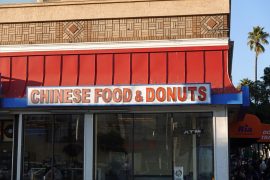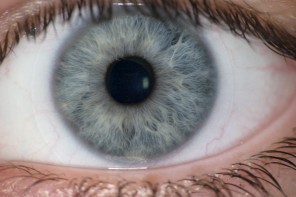Ken Poyner
She hit two hundred pounds, and it was no issue. She is a big boned woman, and tall. She could carry it.
Three hundred was a bit more of a problem. Gravity got just a little too cozy. Some things were better taken sideways, others head on. Entrances became at times a negotiation. Driving a car involved more sliding in and out; seats, when adjusted, were always adjusted to be further away from the wheel. Amusement parks were out of the question. And shopping for clothes was simply work: unproductive and filled with standing and nothing was made for the shape she was learning.
At four hundred pounds, she knew she had to do something. Her bed was becoming one large smile, and stairs were a torment. The weight of her hands busied her shoulders, and her legs made the sound of secrets passed when she slithered in the hallway. She moved downstairs, put a mattress on the floor, and kept visitors at bay. There was nothing she wanted in the top half of her house.
It took her until five hundred pounds to come up with a plan. There was an old plastic rain barrel out back, up close to the house, but not actually in it. Within arm’s reach of the door, and not hard to fumble with. It had a top and could be sealed from the very rain it has been designed to collect. It would be perfect.
So she made a small slit in an easily accessible part of herself, and with a soup spoon pulled out as much fat as she could stand to lose in one sitting, put it all into an ice cream bowl, and walked it to the back where she could lift the lid on the rain barrel and drop it in. Down with a thud it went to the bottom of the uncaring dark in the rain barrel, and she quickly put the lid back on.
This she did each day for several weeks. She would scrape deeper into herself, draw out the marbled fat, and drop it in the rain barrel. As the barrel filled, the sound of the fat falling in became softer, more evenly spread out as at first a sympathetic, then a downright pleasing, rattle of air. At the start, the plop had sounded much like good riddance, but now it sounded almost like safekeeping. There would be a murmur of slipping and sliding and leveling out and perhaps welcome as the new fat found its place in the old fat and the rain barrel’s dark was made a curiously secure and bounded environment by the settling of the lid into its common place.
She did not reach six hundred. But she did not dip below five hundred, either. Weeks this expunging of the fat continued, becoming a customary chore, one that could in two or there bites be sandwiched into commercial breaks and the long lines of credits that bedeviled her television watching. She became comfortable with fitting it in to the dead zones of the life she had come to know. It became simply part of what she did; the reason for her doing it was lost to present sense.
Things still could have gone badly for her. The slit could have started to heal. The spoon, metal, could have bent. The ice cream bowl, ceramic, could have been dropped and broken into one hundred thirty-seven pieces that would not be re-animated by all the special glues she would have been able to find. But this did not happen: the physics of her Universe held.
And then one day, she made a run to level her deposit during a sped up run of credits after and old movie, and when she opened the rain barrel and dropped an ice cream’s bowl worth of fat in, there was again the old plop. That original fat-hitting-the-bottom plop. The sound of fat on plastic; the sound of gravity thinking it had done the best it could and sucked this gift all the way to the bottom. She started to look into the rain barrel, to perhaps tip it into the sun; but the television schedule was moving on, so she went back into the house, all of her curiosity nestled in a fold of an eyebrow, the bowl and spoon dangerously held in but one hand.
And there, on the couch, sat the fat. The next movie of the night’s double feature was about to start and the fat was staring intensely at the screen, even tilting a bit forward as though in anticipation. Despite all that time in the rain barrel, the fat looked remarkably like the woman she had been spooned from, and as the opening lines of the movie began, she was in the actual moment forming ever more like her creator, turning into the woman’s double right there as the woman watched, the woman missing the start of her movie out of sheer surprise. She placed her ice cream bowl and spoon on the reading table that had no reading in it, the ungifted table soldiering at the side of her usual seat, and pulled open both double eyelids as far as she could without external artifice.
Why, this woman’s double, made out of fat, must have weighed five hundred pounds! The woman had no idea she had ladled so much out of herself, that all of it had stayed so long in the rain barrel. Now that she thought of it, of course the rain barrel would have to be emptied. Of course it would reach a limit and the fat already in would need to come out before more could be placed in. Why had she not thought of it?
But the movie was starting, so she sat at the other end of the couch and began to get comfortable with the celluloid world that was being developed in front of her: the knife-sharp men, the insubstantial women, the buildings with their horrible fire escapes and the cabs that did not tilt over when their invisible drivers too late chose to turn.
At the first commercial break, she noticed that her double had an ice cream bowl and a soup spoon as well. She had not yet seen her new double scrape any of her fat, but this was only the first commercial, and she herself had pulled no fat out, preferring to wait until near the end of the presentation, when commercials were placed fast and loose through the lingering plots and lives and festering outcomes: before the thin lady got kissed or the mean man murdered or someone became breathless with conclusion or justice put on its wicked clothes and said no, I am over here.
She thought: they both could use one rain barrel. It would only fill faster.
Ken Poyner lives in the lower right hand corner of Virginia, with his power-lifter wife and a number of house animals. His 2013 e-book, Constant Animals, 42 brief but unruly fictions, is available at all the usual e-book sites, and you should go buy it so more brewery workers have jobs. Recent work is out in Corium, Analog Science Fiction, Spittoon, Poet Lore, Mobius and many other places. He webs at www.kpoyner.com.


